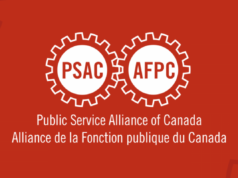After more than ten months of bargaining defined by delays, insulting offers and frustratingly slow progress towards a fair contract, PSAC’s bargaining teams are giving the government one last chance at the negotiating table. The teams, representing 90,000 workers covered by Treasury Board, will be meeting with government officials between April 30 and May 2 in Ottawa. PSAC made it clear to Prime Minister Justin Trudeau over the last few months that his window to restore a respectful relationship with public service workers—as he promised to do back in 2015 —is closing. With the fall federal election looming and the summer parliamentary recess fast approaching, substantial progress must be made at the next bargaining sessions.
Since the beginning of talks last year, PSAC has presented reasonable proposals on behalf of members to improve work-life balance, reduce precarious contract work, close wage gaps with the private sector, and ensure fair economic increases. Unfortunately, the government has been unwilling to take the steps necessary to address these concerns and has insisted on annual wage increases of only 1%, around half the rate of inflation.
Over the last few weeks, PSAC members across the country ramped up pressure on Liberal Members of Parliament to help ensure a fair contract is reached. They organized lobby meetings, rallies and sit-ins, and sent over 4,000 letters warning MPs that time is running out.
PSAC members also reminded Liberal MPs that public service workers are still waiting to be paid correctly more than three years after the flawed Phoenix pay system was launched. And they are still waiting to be compensated for all the hardships they’ve endured. These members should not have to wait any longer for the fair working conditions they deserve.
The coming sessions will cover four bargaining units under Treasury Board: Program & Administrative Services (PA), Technical Services (TC), Operations Services (SV), and Education & Library Science (EB).
The original version of this article was first posted on the PSAC website.





